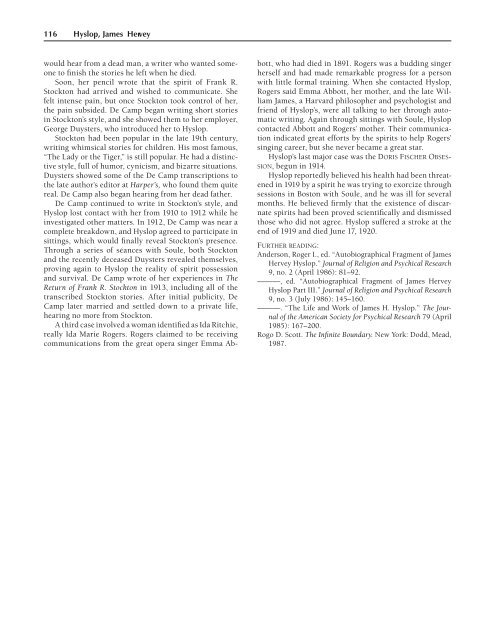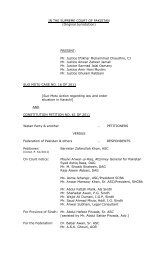The Encyclopedia Of Demons And Demonology
The Encyclopedia Of Demons And Demonology
The Encyclopedia Of Demons And Demonology
Create successful ePaper yourself
Turn your PDF publications into a flip-book with our unique Google optimized e-Paper software.
116 Hyslop, James Hervey<br />
would hear from a dead man, a writer who wanted someone<br />
to finish the stories he left when he died.<br />
Soon, her pencil wrote that the spirit of Frank R.<br />
Stockton had arrived and wished to communicate. She<br />
felt intense pain, but once Stockton took control of her,<br />
the pain subsided. De Camp began writing short stories<br />
in Stockton’s style, and she showed them to her employer,<br />
George Duysters, who introduced her to Hyslop.<br />
Stockton had been popular in the late 19th century,<br />
writing whimsical stories for children. His most famous,<br />
“<strong>The</strong> Lady or the Tiger,” is still popular. He had a distinctive<br />
style, full of humor, cynicism, and bizarre situations.<br />
Duysters showed some of the De Camp transcriptions to<br />
the late author’s editor at Harper’s, who found them quite<br />
real. De Camp also began hearing from her dead father.<br />
De Camp continued to write in Stockton’s style, and<br />
Hyslop lost contact with her from 1910 to 1912 while he<br />
investigated other matters. In 1912, De Camp was near a<br />
complete breakdown, and Hyslop agreed to participate in<br />
sittings, which would finally reveal Stockton’s presence.<br />
Through a series of séances with Soule, both Stockton<br />
and the recently deceased Duysters revealed themselves,<br />
proving again to Hyslop the reality of spirit possession<br />
and survival. De Camp wrote of her experiences in <strong>The</strong><br />
Return of Frank R. Stockton in 1913, including all of the<br />
transcribed Stockton stories. After initial publicity, De<br />
Camp later married and settled down to a private life,<br />
hearing no more from Stockton.<br />
A third case involved a woman identified as Ida Ritchie,<br />
really Ida Marie Rogers. Rogers claimed to be receiving<br />
communications from the great opera singer Emma Abbott,<br />
who had died in 1891. Rogers was a budding singer<br />
herself and had made remarkable progress for a person<br />
with little formal training. When she contacted Hyslop,<br />
Rogers said Emma Abbott, her mother, and the late William<br />
James, a Harvard philosopher and psychologist and<br />
friend of Hyslop’s, were all talking to her through automatic<br />
writing. Again through sittings with Soule, Hyslop<br />
contacted Abbott and Rogers’ mother. <strong>The</strong>ir communication<br />
indicated great efforts by the spirits to help Rogers’<br />
singing career, but she never became a great star.<br />
Hyslop’s last major case was the DORIS FISCHER OBSES-<br />
SION, begun in 1914.<br />
Hyslop reportedly believed his health had been threatened<br />
in 1919 by a spirit he was trying to exorcize through<br />
sessions in Boston with Soule, and he was ill for several<br />
months. He believed firmly that the existence of discarnate<br />
spirits had been proved scientifically and dismissed<br />
those who did not agree. Hyslop suffered a stroke at the<br />
end of 1919 and died June 17, 1920.<br />
FURTHER READING:<br />
<strong>And</strong>erson, Roger I., ed. “Autobiographical Fragment of James<br />
Hervey Hyslop.” Journal of Religion and Psychical Research<br />
9, no. 2 (April 1986): 81–92.<br />
———, ed. “Autobiographical Fragment of James Hervey<br />
Hyslop Part III.” Journal of Religion and Psychical Research<br />
9, no. 3 (July 1986): 145–160.<br />
———. “<strong>The</strong> Life and Work of James H. Hyslop.” <strong>The</strong> Journal<br />
of the American Society for Psychical Research 79 (April<br />
1985): 167–200.<br />
Rogo D. Scott. <strong>The</strong> Infinite Boundary. New York: Dodd, Mead,<br />
1987.












